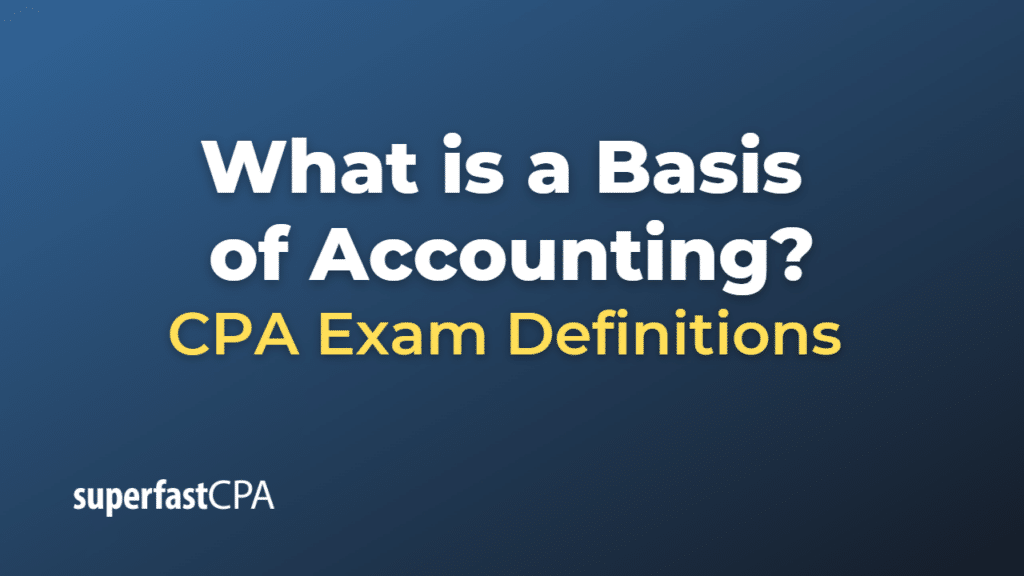Basis of Accounting
A basis of accounting refers to the specific method or framework used to recognize, record, and report financial transactions and events in a company’s financial statements. The choice of accounting basis affects how revenues, expenses, assets, and liabilities are recorded, which in turn impacts the company’s financial performance and position. There are two main bases of accounting:
- Accrual basis of accounting: Under the accrual basis, revenues are recognized when they are earned, and expenses are recognized when they are incurred, regardless of when cash is received or paid. This method provides a more accurate picture of a company’s financial performance and position, as it reflects economic activity rather than cash flows. Accrual accounting is the preferred method under Generally Accepted Accounting Principles (GAAP) and International Financial Reporting Standards (IFRS), which are used by many businesses worldwide.
- Cash basis of accounting: In contrast, the cash basis of accounting recognizes revenues when cash is received and expenses when cash is paid. This method is simpler and easier to understand, but it can be less accurate in reflecting a company’s financial performance and position, as it focuses on cash flows rather than economic activity. The cash basis is generally not accepted under GAAP or IFRS and is more commonly used by small businesses or individuals for tax purposes or simple bookkeeping.
In addition to these two primary bases of accounting, there are some modified versions, such as the modified cash basis or modified accrual basis, which combine elements of both the accrual and cash basis to meet specific reporting needs or comply with certain regulatory requirements.
The choice of accounting basis depends on various factors, including the size and complexity of the business, legal and regulatory requirements, and the needs of financial statement users. It’s essential for businesses to understand and apply the appropriate basis of accounting to ensure accurate and reliable financial reporting and facilitate informed decision-making by management, investors, creditors, and other stakeholders.
Example of a Basis of Accounting
Let’s consider two fictional small businesses—Lucy’s Lemonade Stand and Peter’s Pizzeria—to demonstrate the differences between the cash basis and accrual basis of accounting.
Lucy’s Lemonade Stand uses the cash basis of accounting. In June, Lucy sold $5,000 worth of lemonade and received cash payments for all sales. She also incurred $3,000 in expenses, which she paid in cash. Lucy’s June income statement using the cash basis of accounting would look like this:
Revenue: $5,000
Expenses: -$3,000
Net Income: $2,000
With cash basis accounting, Lucy’s financial performance is based on the cash inflows and outflows during June, regardless of when she actually provided the lemonade or incurred the expenses.
Peter’s Pizzeria, on the other hand, uses the accrual basis of accounting. In June, Peter sold $6,000 worth of pizza. However, he only received $4,000 in cash payments, with the remaining $2,000 billed to customers as accounts receivable. Peter also incurred $3,500 in expenses, of which he paid $2,500 in cash and accrued $1,000 as accounts payable. Peter’s June income statement using the accrual basis of accounting would look like this:
Revenue: $6,000
Expenses: -$3,500
Net Income: $2,500
With accrual basis accounting, Peter’s financial performance is based on the economic activity during June, recognizing revenues when they are earned and expenses when they are incurred, regardless of when cash is received or paid.
These examples illustrate the differences between cash basis and accrual basis accounting. While Lucy’s Lemonade Stand focuses on cash flows, Peter’s Pizzeria’s accounting method reflects the true economic activity of his business. Accrual accounting provides a more accurate picture of a company’s financial performance and position, which is why it is generally preferred and required under GAAP and IFRS for most businesses.













